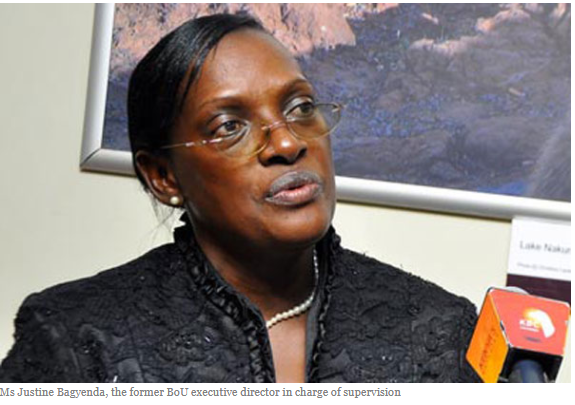There have long been whispers about former Executive Director in charge of Supervision at Bank of Uganda, Justine Bagyenda stashing billions of shillings irregularly after revelations that Shs 20bn was transacted through the civil servant’s personal bank accounts in a period of six years, made just as dust settles on the dubious sell of tycoon Sudhir Ruparelia’s Crane Bank in 2017.
This week, Barclays Bank became the second bank in two weeks to confirm that the account details of Ms. Bagyenda, were leaked to the public, adding fuel to speculation that her financial history may be the most sensitive thing unearthed by investigations into the abuse of office by the once powerful central bank official.
On March 8, Diamond Trust Bank revealed that one of their employees had leaked account details of Bagyenda to the public.
First, in a complaint by the former Opposition Leader in Parliament, MP Nandala Mafabi that the Inspector General of Government (IGG) and Financial Intelligence Authority have remained cagey on investigating Bagyenda, the Budadiri lawmaker says Bagyenda must explain the source of the millions of dollars on her accounts.
“We are going to carryout investigations and we are going to deal with those banks because they have been doing illegal things with Bagyenda. Actually those banks should be closed because they have been involved in money laundering. That lady Bagyenda has been the head of Anti-Money Laundering committee and the law we passed, stated that whoever participates in anti-money laundering has to face prison for 20 years and that is why Bagyenda should have been in Luzira and the law accepts that the money she stole, should be returned,” Hon. Mafabi said Monday while addressing journalists last evening at Parliament.
Why exactly are Bagyenda’s bank accounts suspicious?
No reason has been provided by banks as to why large sums of money were sent to her accounts, apart from apologizing for the leaks to the media.
Bagyenda held 2 accounts at DTB; a Prime Dollar Savings Account, No. 5106903904 and another Low Start Savings Account, No.5106903903- all in her names. It is these two accounts that formed the melting pot for the various transactions. One of her accounts at Diamond Trust Bank for instance, was found to have about a quarter million US Dollars.
Her Barclays Bank Account, according to leaked documents, as of 21 October 2017, had a balance of Shs98m.
At Barclays, the money would blend in together with her salary and or allowances from Bank of Uganda and the Microfinance Support Centre where she was the board chairman.
From her Barclays account she then made small–between UGX10 million and UGX30 million–but regular (usually weekly) transfers to a certain Kenny Muwonge at Centenary Bank. Between August 2015 to September 2016, Bagyenda made 47 weekly wire (RTGS) transactions to Muwonge’s account No. 2120011273 in Centenary Bank, totaling to UGX693 million.
It should be noted that her former boss, Emmanuel Tumusiime Mutebile recently come top as the country’s highest salary earner at just Shs53.3 million per month, Ms Bagyenda’s bank balances means that for the last six months reveal that she has been earning- or saving- Shs266,7223732, or earning Shs66.6 million per week or if you want to be sure, Shs9.5 million per day.
That all makes it very difficult to find a smoking gun—especially given that the leaked bank details show that Justine Bagyenda, while still in office stashed up billions of shillings on various accounts held with commercial banks, on top of rapidly acquiring multiple properties.
Why does all this matter?
The Anti-Money Laundering Act, 2013 (AMLA) defines money laundering as “the process of turning illegitimately obtained property into seemingly legitimate property and it includes concealing or disguising the nature, source, location, disposition or movement of proceeds of crime and any activity which constitutes a crime”.
Mafabi has also said it was wrong for those banks that dealt with Bagyenda and in whose accounts she was keeping the money to dismiss or even open criminal cases against their employees whom they accuse of leaking the account details of Bagyenda saying they are protected by the law.
“Whistleblower’s Act says the whistleblower has all the security of the state and of the organization where that person works but if they have been dismissed, we are going to ask BoU to employ them and if they get any other problem, we will make sure police protects them. That is why even President Yoweri Museveni should come out on this issue apart from if he wants her,” Mafabi urges.
To cap it all, Mark Omona, the technical manager at the Institute of Certified Public Accountants of Uganda, the process of money laundering involves collection of dirty money, and then entering it into the financial system followed by layering through various transfers between various banks.
With plain old money laundering, however, the crime is impossible to deny or overlook—it’s all there for you on paper. But according to the law, anyone who does money laundering in a government office is minimally sentenced to 20 years in jail, but could Uganda’s judiciary really bring themselves to let walk free a proven fraudster?
For feedback and story tips, contact: stephenmuneza@gmail.com, +256772544870 or Twitter @stephenkmuneza











